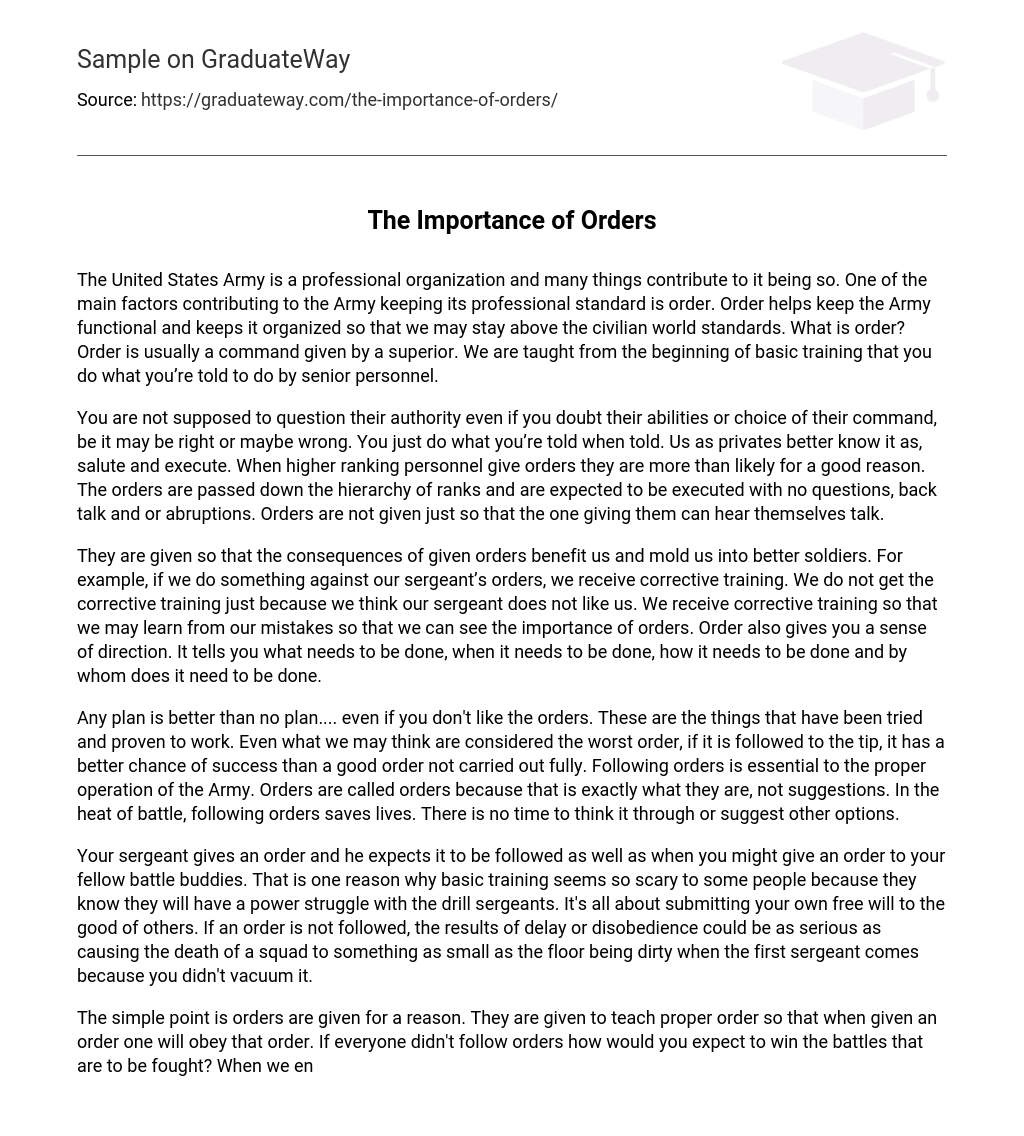Maintaining professionalism in the United States Army involves several factors, with order being a crucial element. Order is essential for ensuring functionality and organization within the Army, enabling it to exceed civilian standards. The concept of order generally refers to directives given by superiors. From the beginning of basic training, we are taught to obey and carry out commands from senior personnel.
The authority of higher ranking personnel should never be questioned, regardless of doubts about their capabilities or decisions. Whether their commands are right or wrong, you must simply follow orders without hesitation. As privates, we understand this as the concept of “salute and execute.” When higher ranking personnel issue orders, they likely have a valid reason behind them. These orders are passed down through the rank hierarchy and are expected to be carried out without questioning, arguing, or interrupting. The purpose of giving orders is not simply for the sake of talking.
The purpose of receiving orders is to benefit and improve us as soldiers. Disobeying our sergeant’s orders results in corrective training which is not given out of personal dislike but rather to help us learn from mistakes and understand the importance of following orders. Orders also provide guidance by informing us about tasks that need to be completed, when they should be done, how they should be done, and who is responsible for them.
Regardless of personal preference, any plan is preferable to no plan. These are established and effective strategies. Even the poorest plan, when fully adhered to, has a greater likelihood of success than a well-conceived plan that is not fully carried out. The Army’s smooth functioning relies on the criticality of following orders. Orders are named as such because they are definitive instructions rather than mere suggestions. In combat situations, obeying orders preserves lives without allowing for analysis or alternative proposals.
Your sergeant and you both expect orders to be followed, whether it’s from your superior or from each other. This is why basic training can be intimidating for some, as they anticipate power struggles with their drill sergeants. The essence of basic training lies in willingly submitting your personal desires for the greater good. Failure to comply with an order can have serious consequences, ranging from the loss of an entire squad to something as trivial as a dirty floor when inspected by the first sergeant due to negligence in vacuuming.
Following orders is vital for maintaining discipline and compliance with instructions, which is crucial for overcoming challenges. When individuals enlist in the Army, Air-force, Navy, or Marines, they make a pledge to obey the president and designated officers. This oath serves as a commitment to our country and God that we will faithfully follow their commands.
The oath signifies my commitment to both my country and my god, pledging that I will faithfully adhere to the instructions of my superiors and fulfill my responsibilities to the best of my abilities. This epitomizes the essence of a true soldier. Numerous compelling rationales exist as to why soldiers must obey their orders, with each holding significant value. An order represents a task assigned to a soldier, requiring prompt and efficient execution. The primary motives for adhering to given orders are to maintain combat effectiveness, foster discipline, and exemplify exceptional soldiering.
Not following orders not only harms soldiers but also the team and mission objectives. It weakens the overall effort to win the war. In a combat zone, not following orders renders soldiers combat ineffective. When a single soldier fails to follow orders in a unit, it hinders progress and forces leaders to handle a soldier who cannot contribute to the workload.
When an NCO directs a private to prepare a vehicle for a mission, the NCO is essentially instructing the private to ensure that the vehicle is ready for combat. Even if the private does not comprehend the rationale behind this instruction, they must execute the order without hesitation. By promptly and accurately following orders as a soldier should, regardless of their level of awareness, they contribute to the unit’s effectiveness. Every soldier plays a critical role in achieving victory in war; by obeying and executing orders effectively and precisely, soldiers enhance their unit’s performance and boost morale. This alleviates any concerns leaders may have about whether soldiers will complete tasks correctly, thus reducing tension among team members. Additionally, distributing work evenly promotes teamwork and facilitates timely completion of tasks according to standards. Envision being in charge during wartime—a thrilling position where you issue commands to subordinates who dutifully carry them out.
Now imagine if the soldiers you were giving orders to didn’t respond to your commands. Instead, they disregarded your words and went their own way. It no longer sounds appealing, does it? So, as the person receiving the orders, consider this. SFC Jones explicitly ordered you to stay and protect the shelters. However, you chose to ignore those instructions and pursue your own agenda. And what happened next? The soldiers who had sought refuge in the shelters lost their lives because of your disobedience.
Not following direct orders can have severe consequences in the US Army. It can lead to reprimands, disciplinary actions such as a UMCJ and demotion, and it can also affect those around you. To become a leader and hold a high position, it is vital to comprehend the significance of order and obeying orders. Failing to learn this skill will hinder your ability to be entrusted with giving orders. Therefore, order and obedience are essential qualities for being an exemplary soldier in the Army.





